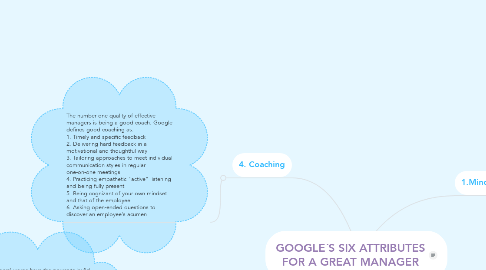GOOGLE´S SIX ATTRIBUTES FOR A GREAT MANAGER
by Indira Ahmed

1. 4. Coaching
1.1. The number one quality of effective managers is being a good coach. Google defines good coaching as: 1. Timely and specific feedback 2. Delivering hard feedback in a motivational and thoughtful way 3. Tailoring approaches to meet individual communication styles in regular one-on-one meetings 4. Practicing empathetic "active" listening and being fully present 5. Being cognizant of your own mindset and that of the employee 6. Asking open-ended questions to discover an employee's acumen
2. 5. Feedback
2.1. Managers' words have the power to build or destroy. Google teaches its supervisors to be consistent (free from bias) when delivering feedback across their teams, to balance positive (motivational) and negative (developmental) feedback, to be authentic and appreciative, and to state growth opportunities in a clear, compassionate way.
3. 6. Decision making
3.1. Routine that includes asking and articulating: What are you solving for, and is everyone on the same page? (Identify and communicate the root cause.) Why is it important? (Does it support other business goals?) Who is the decision maker? How will the decision be made? When can people expect a decision?
4. 1.Mindset and values
4.1. Develop a growth mindset. Believe that intelligence can be cultivated. Leaders more eager to learn, challenge themselves, and experiment. Identify values and leverage them within their management styles. Empower leaders to leverage their individual morals to drive deeper meaning and impact to their work.
5. 2. Emotional intelligence
5.1. Ability to recognize and understand emotions in yourself and others and leverage this awareness to manage your behavior and relationships. Managers who are self-aware make better decisions, communicate more effectively, and are
6. 3. Manager transition
6.1. Encourage new supervisors to share their transition challenges and frustrations with their peers, they simultaneously teach that it's OK to be vulnerable and honest. As managers tell their stories; others chime in with advice and guidance providing actionable new strategies. It's important for all managers to know that you're not in this alone. Others have faced similar


